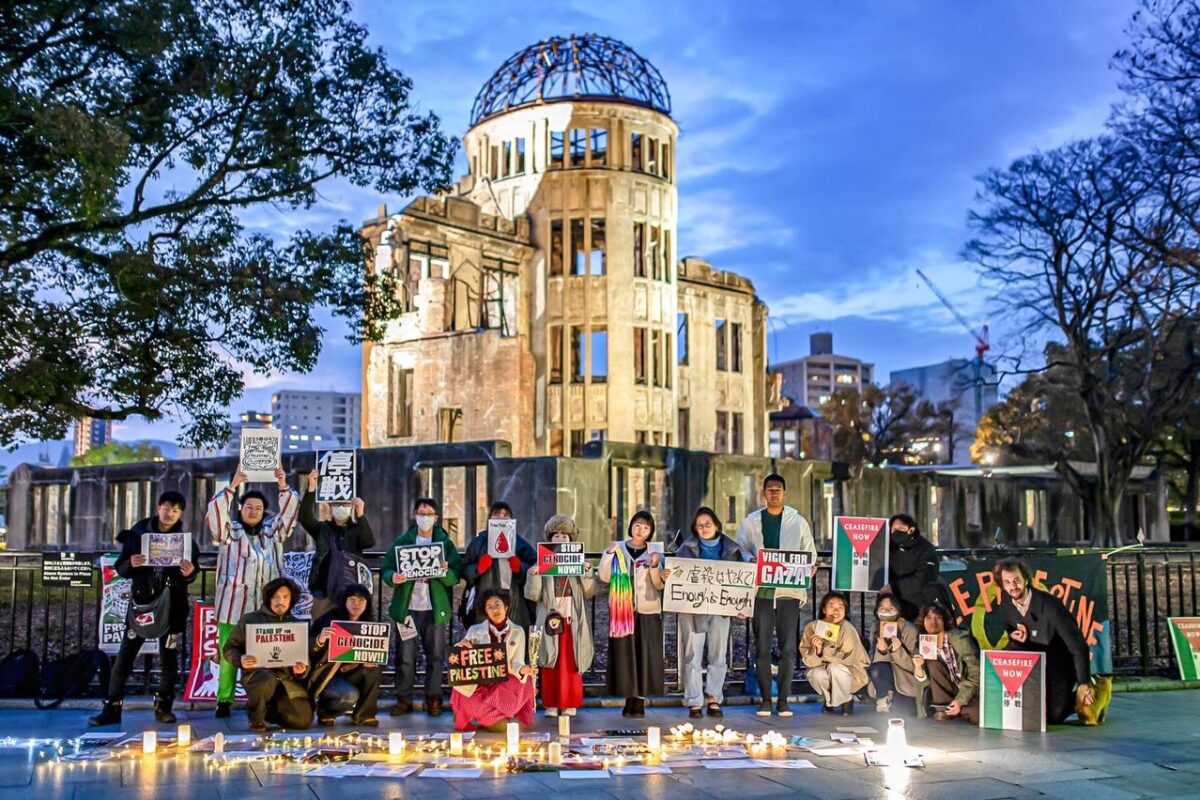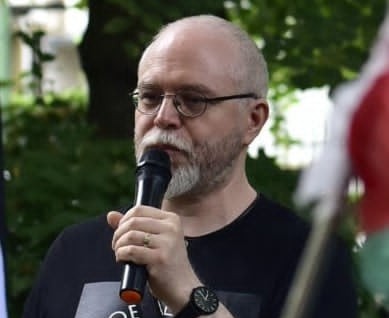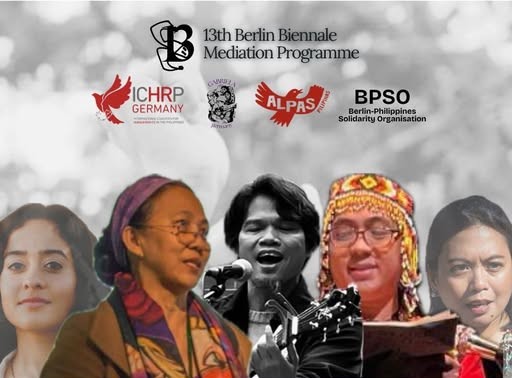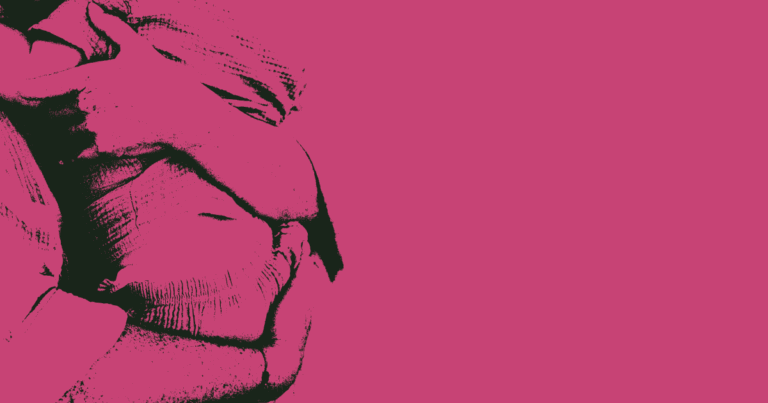In the first part of our conversation, members of the Hiroshima Palestine Vigil reflected on the origins of their nightly gatherings, the reception they’ve received in the city, and their belief that peace must be redefined, not as the absence of war, but as a refusal to look away, wherever violence is taking place.
In this second part, the discussion turns to the deeper historical layers beneath Hiroshima’s “peace” narrative—layers formed not only by the memory of the atomic bombings, but also by Japan’s own history of imperialism and colonialism. Much of this history remains unspoken in official remembrance: Japan’s occupation of Korea, Taiwan, and much of Asia; its use of forced labor and sex slavery from across the region; and the discrimination that continued long after the Asia-Pacific War ended.
In Nagasaki, for example, tens of thousands of Koreans and Chinese were brought under colonial rule and forced to work in arms factories, mines, and shipyards. Many were killed in the atomic bombing, yet their stories remain marginal in national memory. Survivors were denied Japanese citizenship after the war, excluded from equal compensation, and often faced language barriers and bureaucratic hurdles that prevented them from receiving support. This selective remembrance—the centering of some victims while erasing others—shapes how Japan understands its past, and in turn, how it responds to violence in the present, most starkly the genocide in Gaza.
Here, the Vigil’s members—Rebecca Maria Goldschmidt, a Jewish and Filipino anti-Zionist artist and Sailor Kannako, an artist and clothing store clerk from Hiroshima; are joined by Lisa and another member of Nagasaki for Palestine (NFP). Together they draw parallels between the forgotten victims of Nagasaki and the silenced voices in Gaza, reflecting on how histories of both victimhood and perpetration must shape solidarity today.
Do you see similarities between what happened in Hiroshima and Nagasaki and what’s happening in Gaza, not only in the destruction, but also in how the victims are spoken about or potentially even forgotten?
Rebecca: There are many parallels simply in the everyday, desperate reality of the situation of Gaza and the aftermath of the bombs: the mass death, the lack of food, thousands of orphaned children, contamination, cultural and societal collapse, psychological and physical illness and disease, no work, the terrorization of civilian communities and the crushing of morale to force defeat.
Additionally, even though they were used during wartime, the atomic bombs were part of the US weapons development and testing program and part of the 2,000+ nuclear weapons tests that were done worldwide. The US and Japanese governments also relentlessly studied the hibakusha up until this day. The data they gleaned from the effects of the bomb on the human body (and still do, as the studies continue) provides them with priceless data that continues to inform technological “progress”.
Palestine, as we know, is also a laboratory to develop and improve “battle-ready” weapons on a human population and document their impacts. What connects Hiroshima, Nagasaki and Gaza is not the fact that they are all “locations of bombings”, but the context of their destruction as part of a legacy of weapons technology development and testing, and the ideology of white supremacy that necessitates, designs, and enacts these horrors.
Japan’s own imperialism and settler-colonial endeavors during the war also parallel the occupation of Palestine. Japan has more in common with Israel than it wants to admit—the overt massacre of babies and children, intentional starvation, sexual violence, prisoner torture, etc. I don’t see the Hiroshima-Nagasaki victims as being forgotten at all, I see them as being deified and their stories utilized to justify re-militarization, despite struggling for decades to be seen and heard. I see the millions of victims of Japanese imperialism—1 million Filipinos, 2 million Vietnamese, 10–20 million Chinese, etc.— also being eclipsed by the stories of Hiroshima-Nagasaki victims. Even the Korean and Chinese hibakusha are erased by the Japanese victimhood narrative.
Most people in Japan don’t know the details of their own family’s participation in imperial war crimes, and the government actively advances historical revisionism. This is just one reason why we have seen such a rapid rise in anti-foreigner hatred and open xenophobia during Japan’s recent elections.
Do you think confronting these erased histories could change how Japan responds to the genocide in Gaza or other struggles for justice today?
Rebecca: Japan has cultivated both a self and public image of pacifism, but with the 80th anniversary of the bombs, a lot of hidden stories are coming to light that are challenging this “nation of peace”.
I came to Japan to better understand the Japanese military occupation of the Philippines that I had heard about from my grandmother. Why was it that no one talked about it even if it was the most violent period in Filipino history? Most Japanese people I talked to had no idea there even was an occupation in the Philippines. That was shocking to me, so when the Gaza genocide started, it made sense that people ignored it. Of course within the anti-war movement there are many Japanese people who are confronting these issues head-on, whether around Okinawa or the sex slavery issue. I have a lot of respect for them as I also take responsibility for the shameful actions in my own zionist family history. I can see the overlap between people who acknowledge Japanese historical atrocity and can draw parallels to what is happening again in Gaza and in other colonial contexts.
Recently in Japan, politicians or famous people have been making revisionist comments, like the Battle of Okinawa “wasn’t that bad”, or that the rape of Nanking never happened. I think in order for any society—Israel, Japan or Germany—the first step toward “atonement” is acknowledging that these crimes are real. In the case of Gaza, however, denial continues, despite this being the most documented genocide in history.
Clearly both “Peace education” and “Holocaust education” systems have failed miserably. Even if people do know what happened, no one was taught what to do when it starts happening again—just look at the ICE kidnappings in the US or the poor treatment of migrant workers in Japanese detention.
In all these contexts, political education around state power, the roots of racism and ethno-supremacy, how “victimhood” is weaponized, necrocapitalism, the list goes on—all of this must be exposed alongside the images we see, otherwise we really are just on a carousel of repeated atrocities with more efficient technology every time. Just “knowing” is not enough for people to take action. There has to also be a sense of political agency and a culture of caring for other people who might not look or act like you, but whose lives are still inherently valuable.
Nagasaki’s victims included many Korean and Chinese forced laborers whose suffering is rarely centered in the city’s memorials. What do you think this says about whose suffering is recognized, and whose is left out, in Japan’s culture of remembrance?
Lisa from NFP: In Nagasaki, it is believed that around 20,000 Koreans and about 650 Chinese laborers were exposed to the atomic bomb. My grandmother recalled that Korean laborers also worked outside the weapons factory she was in, but she had no idea what became of them after the bombing.
At the same time, the hypocenter of the atomic bombing in Nagasaki, Urakami, was located about 3km from the center of Nagasaki city. It was home to many Kakure Kirisitan, hidden Christians, who had preserved their faith in secret through over 250 years of persecution. However, as reconstruction efforts prioritized the city center, many of them were left behind, unable to receive adequate medical care or compensation due to poverty, social discrimination, and isolation.
In Nagasaki, there are relatively few testimonies from Christians in Urakami who survived the atomic bombing. Testimony collection and oral history projects have often focused on survivors living in the city center or those who were more socially visible, leaving many marginalized voices unheard. I believe this represents a significant difference in the culture of memory between Hiroshima, where the city center was the hypocenter, and Nagasaki.
Anonymous from NFP: Many Chinese and Korean people who were forced to work in Mitsubishi’s arms factories and related facilities in Nagasaki had been kidnapped by the Japanese army during the occupation. I can only imagine how difficult it must have been for their families to find out about their situation after the bombing.
There are separate memorials for Chinese and Korean victims in the corners of the Peace Memorial Park, and ceremonies for them are held separately. There is also a separate museum that exhibits not only information about the bombing victims but also the crimes of the Japanese army in the Asia-Pacific region before and during the war.
As a Japanese person who grew up in downtown Tokyo in the 1980s, I did not learn these facts in school. I hope that the standard Japanese education curriculum will teach them, so that we can truly regret what must be regretted, instead of trying to forget.
In light of this selective remembrance, how do you think we can build genuine solidarity today? Not just symbolically, but in material or political terms? For example, how should solidarity with Palestinians be demonstrated beyond words or gestures?
Sailor Kannako: To me, solidarity means to empathize with others and to keep acting in ways that complement each other’s shortcomings. To do this, I think it’s necessary to face our own experiences and continue to speak in our own words, with our own feelings, so that emotions such as regret and anger—the triggers of empathy—don’t fade away. I have seen the suffering of the Palestinian people ignored and misunderstood by the international community for many years.
In Japan, when women experience sexual violence, their complaints are often not believed, and it’s often said the victim was at fault. I’ve had a similar experience, and I imagined that Palestinians have felt a similar deep regret and anger. That feeling made it impossible for me not to take action. If the world that once hurt me is now hurting someone else, my wounds will never heal.
People in Gaza are now asking, “What crime have we committed?” I think those who were burned by the atomic bombs in Hiroshima and Nagasaki must have been filled with that same regret and anger. My experience may be insignificant compared to their pain, but it’s connected. I believe that only by trusting our own feelings and summoning the courage to speak about Gaza in our own words can we build strong bonds of empathy and create lasting, enormous solidarity.
What do you wish people outside Japan understood about Japan’s relationship to Palestine, or about protest in Japan in general?
R: Protest in Japan is usually considered a nuisance, laughable, something done by irrational people. The Japanese public is also generally unaware of the reality of what is happening in Palestine and Gaza. Therefore, the people who are taking the risk to speak up, often against the wishes of their families, workplaces, and communities, are actually pushing up against massive societal and cultural pressure.
No one is a hero, the genocide is still ongoing, and I still think we could do much more from Japan—but the people who have fought bravely for Palestine in Japan against their own set of constraints do work very hard. Everyone tells us about the one guy in Tokyo who stands alone every day on the street yelling about the genocide. Yes, he’s awesome, but the story is misleading because he’s not alone! In Tokyo, there is a strong solidarity movement led by Palestinians, and there is an extensive network throughout Japan, even in very rural areas, that is cross-cultural, intergenerational, and interfaith, trying its best to be intersectional and inclusive.
Every movement has its internal struggles, but we are proud to be part of a truly unique moment in history. The movement for Palestine in Japan did not start on Oct. 7, there have been decades of researchers, artists, students, and activists who have supported and engaged with Palestinians and I feel grateful to be part of this lineage. We are standing with the Palestinian people and the entire world against domination, fascism, and up against a lot of our own ghosts. But we continue to fight in the tradition of many of our ancestors, from the anti-war and anti-nuclear movements, the student, women’s, queer, and environmental movements, and other decolonial peoples’ struggles for dignity, equality, justice and liberation.
Finally, are there any ways people can support your groups?
Follow us on Instagram @hiroshima_palestine_vigil and @nagasakiforpalestine
Buy the zines written by young people in Gaza that we have translated into Japanese:
Gazagazagaza.base.shop
Make a donation to one of the projects we have been supporting:
@GazaSoupKitchen
Challenge Classes
Eman Al-haj Ali GoFundMe
Never stop talking about Palestine!




